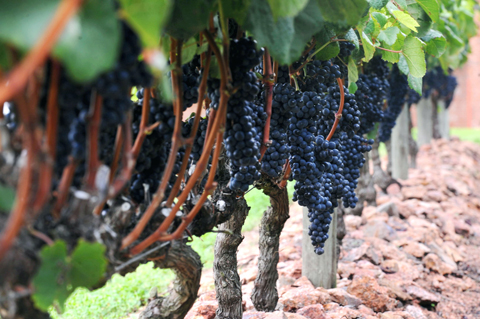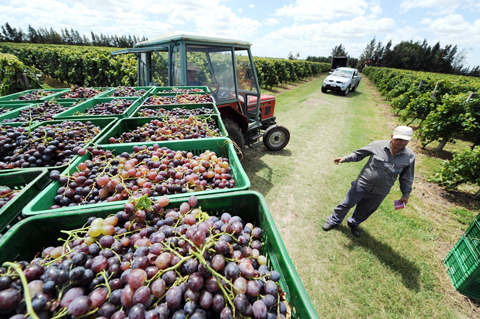Argentina has its Malbec. Chile has its Carmenere. Now Uruguay, not to be out-muscled by its more famous wine-producing neighbors, is taking the world of viticulture by storm, with its distinctive Tannat wines.
Uruguay, the fourth most important wine-producing country in South America, grows a variety of grapes, but none more celebrated than Tannat, which is fueling this tiny country’s rise to prominence in the wine world.
Over the years, Tannat has come to be seen as the quintessential Uruguayan grape and wine, representing about 40 percent of the country’s entire wine production.

PHOTO: AFP
Now bold and full-bodied Tannat wines are putting upstart Uruguay on the map and winning prizes against competition fronted by more established regional rivals.
“Tannat is opening doors for us,” winegrower Virginia Stagnari proudly said.
Her Italian immigrant family founded the Antigua Bodega Stagnari, some 20km north of Montevideo, one of the country’s leading vineyards.

PHOTO: AFP
Although Uruguay’s wines are just beginning to gain a global foothold, it has a long history of viticulture, dating back some 250 years when French and Spanish immigrants brought the vine to the New World.
The hardy Tannat grape, originally from southeastern France, was introduced to Uruguay in 1870 by the Basque Frenchman Pascual Harriague, an immigrant who was looking for a varietal that would thrive in Uruguay’s soil and climate.
Since the 1990s, Uruguay has been exporting high quality wine throughout Latin America, the US and even in the countries of the Gulf.
This tiny country of some 3.4 million inhabitants, dwarfed by its larger neighbors Brazil and Argentina, now enjoys a growing reputation as a producer of superlative wines for a reasonable price.
Some 8,200 hectares of vineyards have been cultivated by about 1,800 wine producers.
Stagnari said her family’s vineyard was established in 1929 by her maternal grandfather, an immigrant from Italy, and today produces 140,000 liters of various types of wine, exporting every fifth bottle out of the country to destinations such as Brazil, Mexico, Belgium and Sweden.
Another highly regarded label here, Bouza, although barely a decade old, produces what are generally deemed to be some of this country’s most exquisite wines, including not only Tannats, but varietals such as Albarino, Chardonnay and Merlot.
To obtain top quality wines “we have to expend a lot of man-hours,” said the company’s resident eonologist, Eduard Boido.
The quest for memorable wines also means “maintaining the biodiversity of the vineyard,” Boido said, as well as cultivating the grapes “in parcels of land no larger than a half-hectare in size.”
Small scale viticulture allows for quality control and ensures the “traceability” of each bottle — something that Uruguay’s industry overseers INAVI, the national institute of wine culture, insists upon.
INAVI says Uruguay exported 1.2 million liters of wine in 2004, with a value of some US$3.3 million. In 2008, it sold 13.4 million liters valued at US$10.6 million.
Viniculture in Uruguay was dealt a major setback by the global financial crisis, however. Last year, it succeeded in selling only 2 million liters, valued at about US$6 million.
Uruguay expects to make up lost ground quickly now that the economic recovery is underway, but even the most avid oenophiles agree that Uruguay’s wine industry will rise and fall on the quality of each individual bottle of ruby red Tannat.

The combined effect of the monsoon, the outer rim of Typhoon Fengshen and a low-pressure system is expected to bring significant rainfall this week to various parts of the nation, the Central Weather Administration (CWA) said. The heaviest rain is expected to occur today and tomorrow, with torrential rain expected in Keelung’s north coast, Yilan and the mountainous regions of Taipei and New Taipei City, the CWA said. Rivers could rise rapidly, and residents should stay away from riverbanks and avoid going to the mountains or engaging in water activities, it said. Scattered showers are expected today in central and

People can preregister to receive their NT$10,000 (US$325) cash distributed from the central government on Nov. 5 after President William Lai (賴清德) yesterday signed the Special Budget for Strengthening Economic, Social and National Security Resilience, the Executive Yuan told a news conference last night. The special budget, passed by the Legislative Yuan on Friday last week with a cash handout budget of NT$236 billion, was officially submitted to the Executive Yuan and the Presidential Office yesterday afternoon. People can register through the official Web site at https://10000.gov.tw to have the funds deposited into their bank accounts, withdraw the funds at automated teller

COOPERATION: Taiwan is aligning closely with US strategic objectives on various matters, including China’s rare earths restrictions, the Ministry of Foreign Affairs said Taiwan could deal with China’s tightened export controls on rare earth metals by turning to “urban mining,” a researcher said yesterday. Rare earth metals, which are used in semiconductors and other electronic components, could be recovered from industrial or electronic waste to reduce reliance on imports, National Cheng Kung University Department of Resources Engineering professor Lee Cheng-han (李政翰) said. Despite their name, rare earth elements are not actually rare — their abundance in the Earth’s crust is relatively high, but they are dispersed, making extraction and refining energy-intensive and environmentally damaging, he said, adding that many countries have opted to

PEACE AND STABILITY: Maintaining the cross-strait ‘status quo’ has long been the government’s position, the Ministry of Foreign Affairs said Taiwan is committed to maintaining the cross-strait “status quo” and seeks no escalation of tensions, the Ministry of Foreign Affairs (MOFA) said yesterday, rebutting a Time magazine opinion piece that described President William Lai (賴清德) as a “reckless leader.” The article, titled “The US Must Beware of Taiwan’s Reckless Leader,” was written by Lyle Goldstein, director of the Asia Program at the Washington-based Defense Priorities think tank. Goldstein wrote that Taiwan is “the world’s most dangerous flashpoint” amid ongoing conflicts in the Middle East and Russia’s invasion of Ukraine. He said that the situation in the Taiwan Strait has become less stable